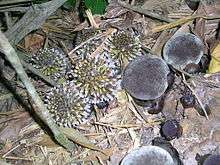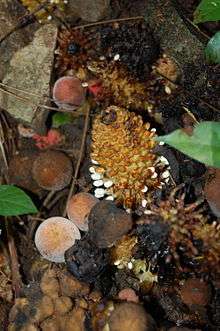Balanophoraceae
| Balanophoraceae | |
|---|---|
 | |
| A Balanophora sp. from the Western Ghats | |
| Scientific classification | |
| Kingdom: | Plantae |
| (unranked): | Angiosperms |
| (unranked): | Eudicots |
| (unranked): | Core eudicots |
| Order: | Santalales |
| Family: | Balanophoraceae Rich.[1] |
| Genera | |
|
17, see text | |
The Balanophoraceae (from the inflorescence which appears to be covered by barnacles) are a subtropical to tropical family of obligate parasitic flowering plants, notable for their unusual development and obscure affinities. The family consist of 17 genera and around 44 known species.[2] The plants are normally found in moist inland forests growing on tree roots and have an aboveground inflorescence with the overall appearance of a fungus, composed of numerous minute flowers. The inflorescences develop inside the tuberous underground part of the plant, before rupturing it and surfacing. The plants are monoecious, or dioecious, and the fruits are indehiscent drupes or nuts. The underground portion, which attaches itself to the host, looks like a tuber, and is not a proper root system. The plants contain no chlorophyll. Balanophora means "bearing an acorn" (shape of the female inflorescence).
In the classification system of Dahlgren the Balanophoraceae were placed in the order Balanophorales in the superorder Balanophoriflorae (also called Balanophoranae). The APG II system, of 2003 (unchanged from the APG system, of 1998), also recognizes this family, but leaves it unplaced as to order and higher grouping. The APG III system and AP-Website indicate that the family should be included in the order Santalales (post APG II), where it was also placed by the Cronquist system (1981).[1]
The species Balanophora elongata is a parasite on tree roots and can be found in montane forest such as that of the Mount Gede Pangrango National Park in the Indonesian province of West Java.[3]
Genera
- Balanophora
- Chlamydophytum
- Corynaea
- Dactylanthus
- Ditepalanthus
- Exorhopala
- Hachettea
- Helosis
- Langsdorffia
- Lophophytum Schott & Endl.
- Mystropetalon
- Ombrophytum Poepp. ex Endl.
- Rhopalocnemis
- Sarcophyte
- Scybalium
- Thonningia
-

Balanophora indica (northwestern Thailand)
-

Male stems
-
Female stems
-
B. fungosa in rainforest near Cairns, North Queensland
References
- 1 2 Angiosperm Phylogeny Group (2009). "An update of the Angiosperm Phylogeny Group classification for the orders and families of flowering plants: APG III" (PDF). Botanical Journal of the Linnean Society. 161 (2): 105–121. doi:10.1111/j.1095-8339.2009.00996.x. Retrieved 2013-07-06.
- ↑ Christenhusz, M. J. M.; Byng, J. W. (2016). "The number of known plants species in the world and its annual increase". Phytotaxa. Magnolia Press. 261 (3): 201–217. doi:10.11646/phytotaxa.261.3.1.
- ↑ Whitten, Tony and Jane (1992). Wild Indonesia: The Wildlife and Scenery of the Indonesian Archipelago. United Kingdom: New Holland. p. 127. ISBN 1-85368-128-8.
External links
| Wikimedia Commons has media related to Balanophoraceae. |
- Balanophoraceae in L. Watson and M.J. Dallwitz (1992 onwards). The families of flowering plants: descriptions, illustrations, identification, information retrieval. Version: 2 June 2006. https://web.archive.org/web/20070103200438/http://delta-intkey.com:80/
- Balanophoraceae at Parasitic plants
- NCBI Taxonomy Browser
| Wikispecies has information related to: Balanophoraceae |